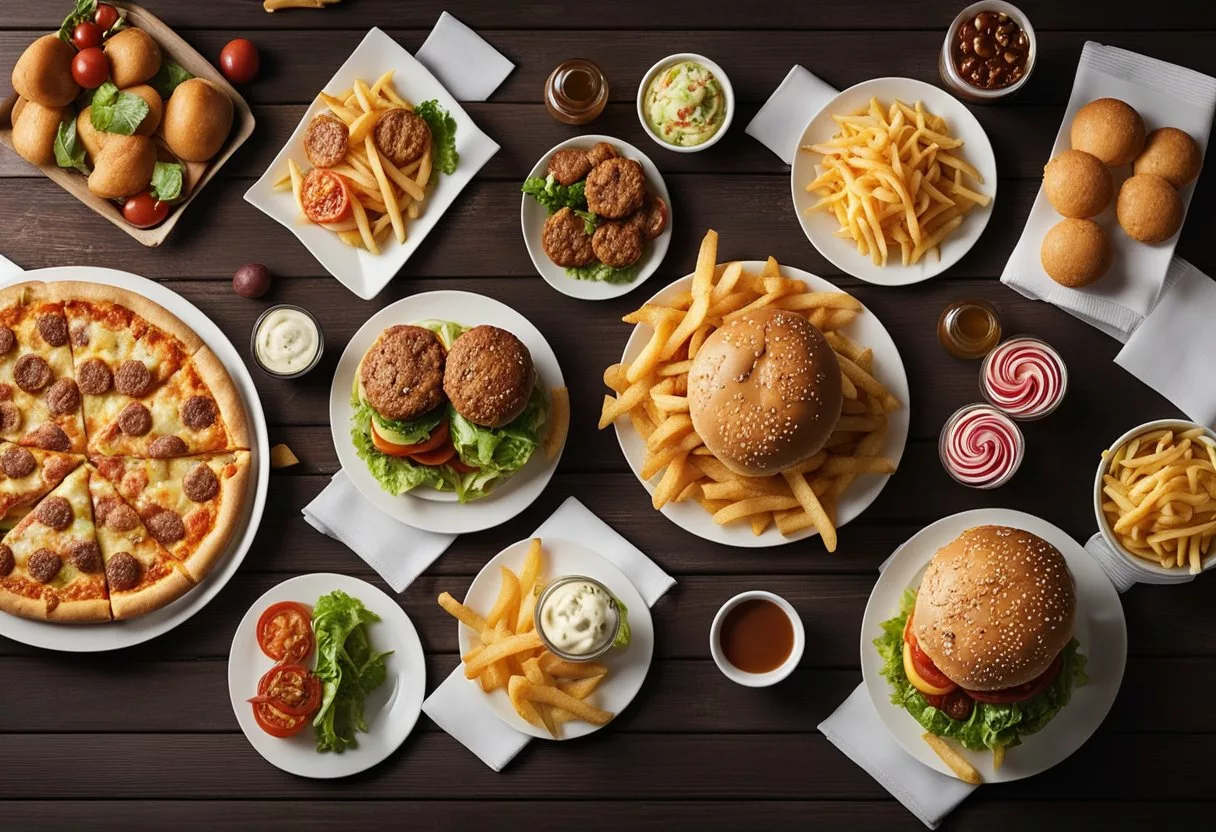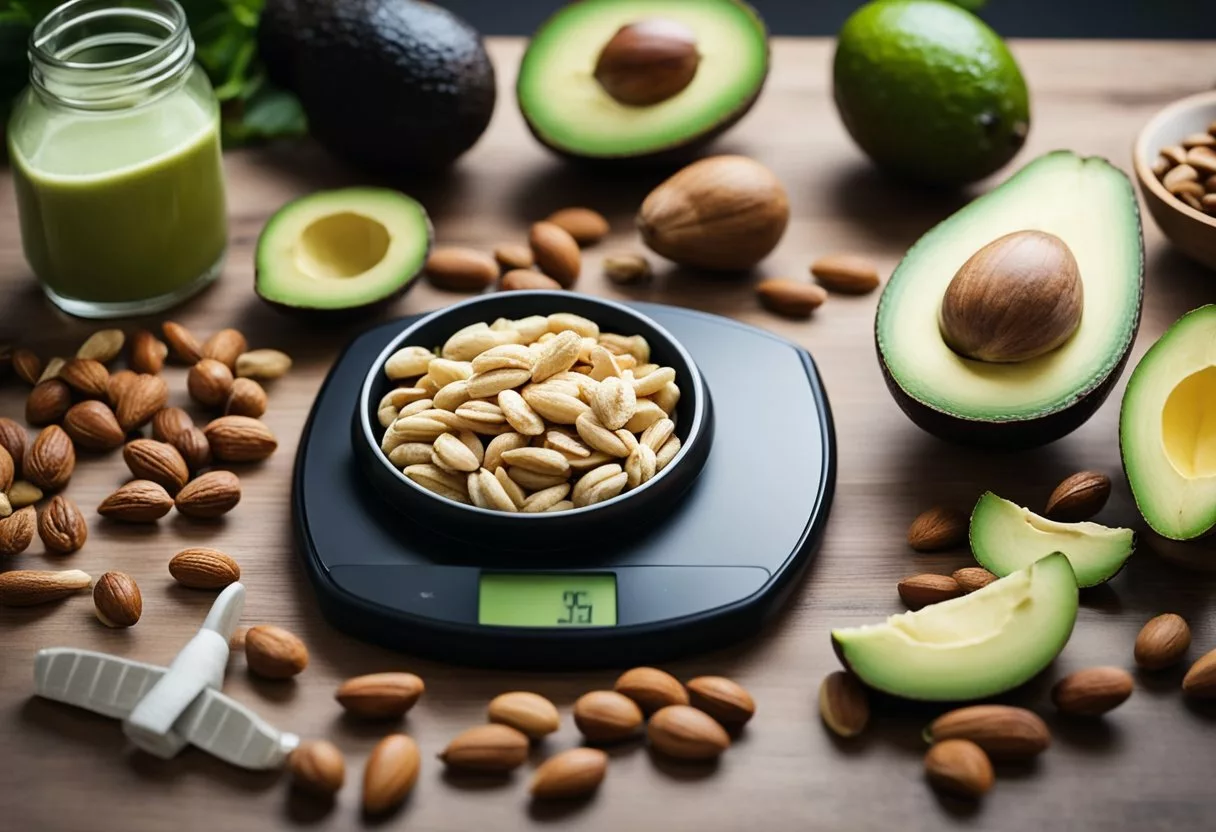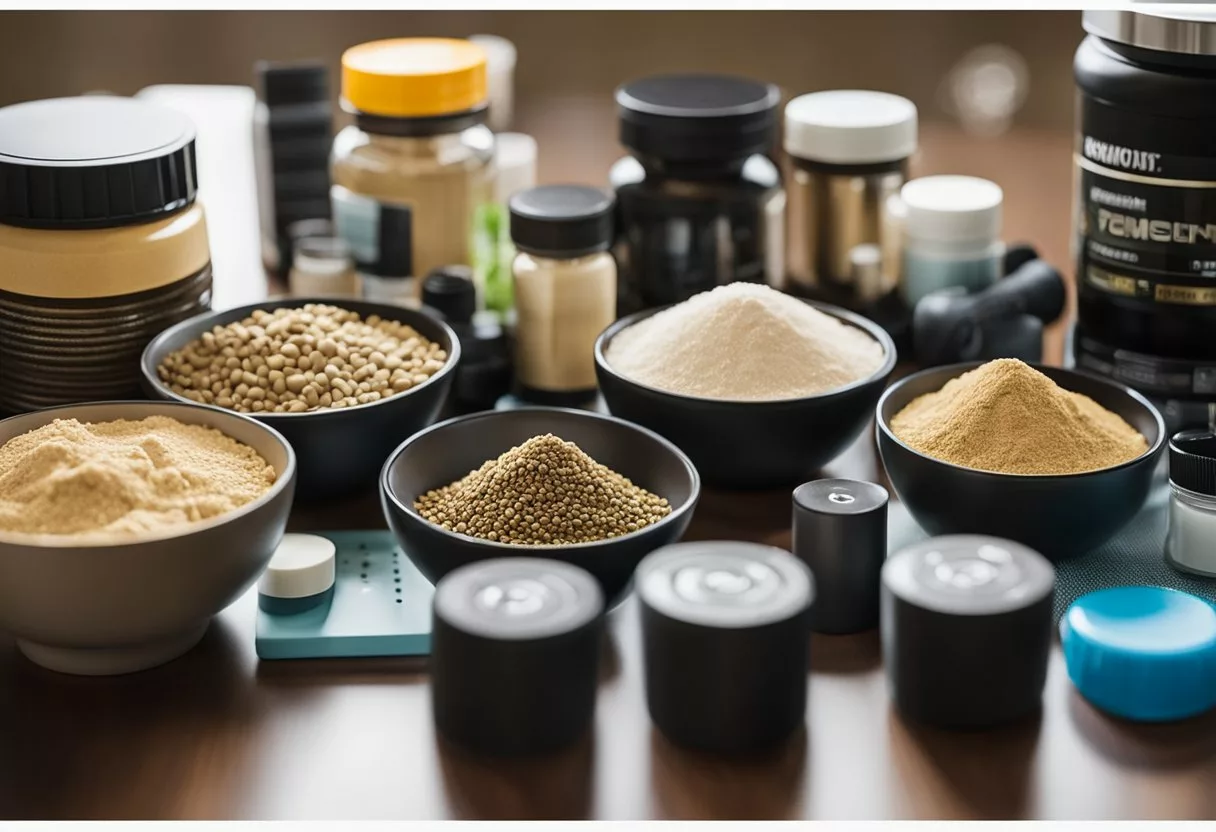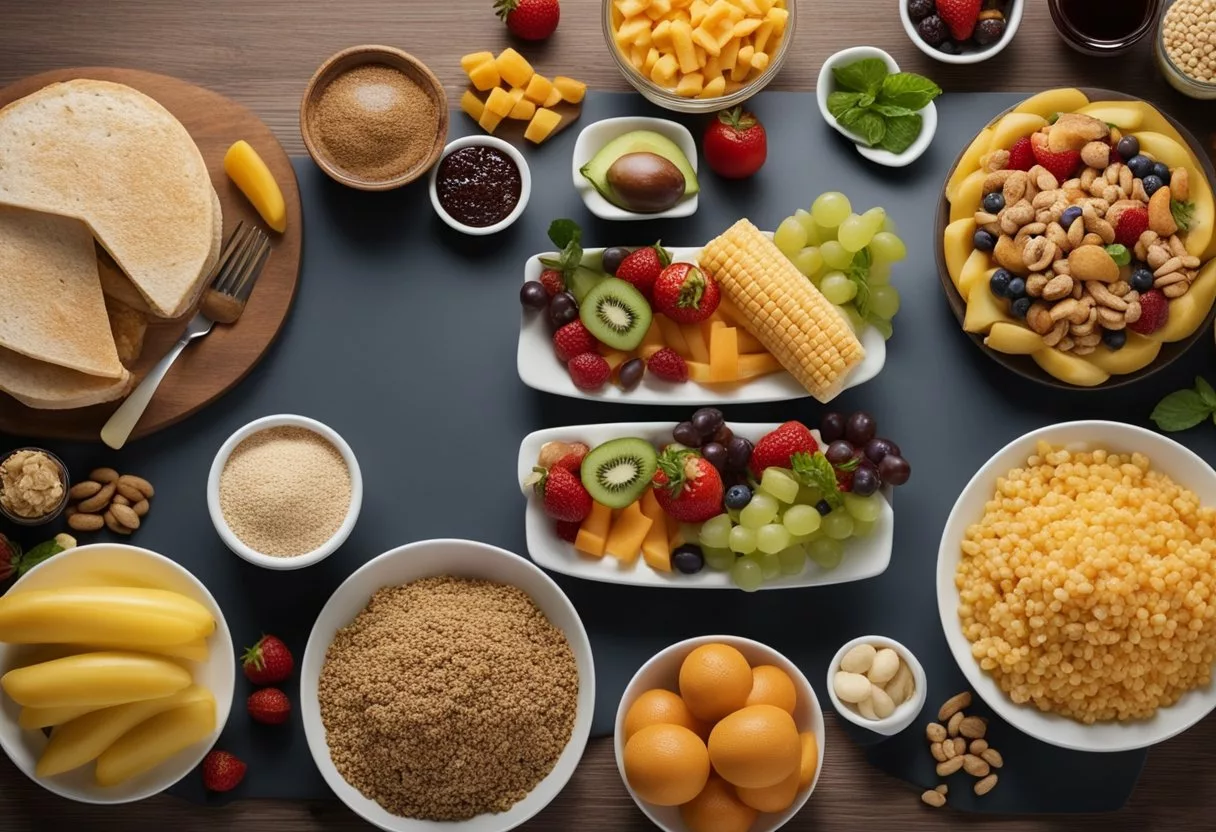Gaining weight in a healthy way can be just as challenging as losing it. Whether you’re underweight or looking to build muscle, it’s crucial to approach weight gain with a thoughtful plan. Eating more nutrient-dense foods and increasing your calorie intake can help you reach a healthy weight.

To gain weight effectively, focus on incorporating foods high in calories and nutrients into your diet. This includes items like nuts, dairy products, and red meats. Along with eating more, regular exercise, particularly strength training, can help in building muscle mass, not just adding fat.
Key Takeaways
- Increase your calorie intake with nutrient-dense foods
- Regular strength training can aid in muscle growth
- Focus on a balanced approach to avoid potential health risks
Understanding Weight Gain Fundamentals

Gaining weight involves understanding how calories, macronutrients, nutrient density, and various factors influence body weight and overall health.
The Role of Calories
Calories are the basic units of energy found in food. To gain weight, a person must consume more calories than their body burns. This is often referred to as a calorie surplus. For instance, consuming an extra 500 calories per day can lead to gaining about one pound per week. Monitoring calorie intake is crucial for those looking to increase their body mass index (BMI). Tools like calorie counters can help track daily intake and ensure that the necessary calorie goals are met.
Macronutrients for Weight Gain
Macronutrients—protein, carbohydrates, and fats—play a significant role in weight gain. Protein supports muscle growth and should be included in every meal through foods like chicken, fish, and legumes. Carbohydrates provide energy and are essential for increasing body weight, with whole grains, fruits, and vegetables being excellent sources. Fats are the most calorie-dense of the macronutrients, making them important for gaining weight. Healthy fats, such as those found in nuts, avocados, and olive oil, are preferable.
Importance of Nutrient Density
Choosing nutrient-dense foods ensures that one meets their calorie goals without compromising health. These foods are rich in vitamins, minerals, and other nutrients essential for overall well-being. Energy-dense foods like nuts, seeds, avocados, and dried fruits are particularly effective for weight gain because they pack a high number of calories in a small volume. This makes it easier to consume the extra calories needed without feeling overly full or uncomfortable.
Factors Influencing Weight Gain
Several factors can influence the ability to gain weight. Age and genetics play a role, as metabolism tends to slow down with age, and genetic predispositions can affect body weight. Health conditions and medications can also impact weight gain. For instance, conditions like hyperthyroidism can make it difficult to gain weight. Metabolism varies widely among individuals, and those with a higher metabolic rate may need to consume even more calories to see weight gain. Understanding these factors can help tailor a weight gain plan that is effective and sustainable.
Designing Your Weight Gain Diet

Successfully gaining weight involves planning meals with high-calorie, nutrient-dense foods, snacking smartly, incorporating healthy fats, staying hydrated, and using effective eating strategies. This ensures that the extra calories contribute to overall health and energy.
Meals and Food Choices
Opt for meals that are both high in calories and rich in vital nutrients. For breakfast, scrambled eggs with whole wheat toast and avocado provide protein, healthy fats, and carbohydrates. Lunch can include a chicken breast sandwich on whole grain bread with a side of sweet potatoes and a salad.
Dinner might consist of grilled salmon, brown rice, and steamed broccoli. Including dairy products like milk, cheese, and yogurt adds extra protein and calcium. Nuts, seeds, and whole grains like quinoa and oats are also essential components. A balanced plate ensures all macronutrients—proteins, fats, and carbohydrates—are covered.
Smart Snacking for Weight Gain
Snacking is crucial to boost calorie intake without feeling overly full. Choose energy-dense snacks such as peanut butter on whole grain bread, trail mix with nuts and dried fruit, or cheese and whole grain crackers. Greek yogurt with honey and almonds packs protein and healthy fats.
Nut butters, like almond or cashew butter, on apple slices or celery sticks, make a quick and nutritious snack. Incorporating snacks that balance protein, fat, and carbohydrates helps maintain energy levels throughout the day and supports muscle gain.
Incorporating Healthy Fats
Healthy fats are essential for gaining weight and providing long-lasting energy. Incorporate more avocados, olive oil, and avocado oil into meals. Use these oils for cooking or salad dressings. Fatty fish like salmon are high in omega-3 fatty acids and protein, beneficial for overall health.
Nuts and seeds, like almonds and flaxseeds, can be added to cereal, yogurt, or eaten as snacks. Nut butters provide convenient and tasty options to increase fat intake. Healthy fats are calorie-dense, making them a key component of a weight gain diet.
Hydration and Weight Gain
While focusing on food, don’t forget to stay hydrated. Water is essential for all bodily functions, but for weight gain, consider calorie-containing beverages. Whole milk, smoothies, and protein shakes can add extra calories and nutrients.
Drinking water-rich foods like fruits and vegetables helps maintain hydration. Avoid filling up on water before meals, as this can reduce appetite. Proper hydration supports digestion and nutrient absorption, crucial for weight gain.
Eating Strategies and Meal Planning
Effective eating strategies, such as increasing meal frequency and portion sizes, can help you consume more calories throughout the day. Aim for three main meals with added mid-morning and mid-afternoon snacks.
Using large plates can encourage bigger portion sizes. Plan meals ahead to ensure a consistent intake of high-calorie and nutrient-dense foods. Consulting a registered dietitian can help tailor a meal plan to meet individual needs and preferences while ensuring a balanced diet.
Lifestyle Adjustments for Weight Gain

Gaining weight in a healthy manner involves a combination of strategic exercise, managing your appetite effectively, and ensuring proper rest and recovery. Here’s how these factors contribute to healthy weight gain.
Exercise and Muscle Mass Enhancement
Regular exercise, particularly strength training, is crucial for those looking to gain weight. Strength training helps to build muscle mass by creating small tears in the muscle fibers that, when repaired, result in stronger and larger muscles.
By incorporating exercises such as weightlifting, squats, and deadlifts, individuals can target multiple muscle groups. Working with an RD (Registered Dietitian) or a personal trainer can help in creating a tailored workout plan.
People should aim to increase their caloric intake to fuel these workouts, ensuring they consume enough protein to support muscle repair and growth. Foods like lean meats, eggs, and legumes are excellent sources of protein that can aid in building muscle.
Understanding and Managing Appetite
Effectively managing your appetite is essential for healthy weight gain. Eating more frequently throughout the day can help; trying to eat 5 to 6 small meals can be beneficial.
Incorporating energy-dense yet healthy foods can increase caloric intake without feeling overly full. Examples include nuts (like almonds and peanuts), dried fruit (like raisins and prunes), and high-fat dairy products. These foods provide essential nutrients while helping to achieve a calorie surplus.
Engaging a doctor or dietitian can be beneficial if there are underlying issues affecting appetite, such as an eating disorder. They can provide strategies and support to help manage appetite effectively.
Rest and Recovery
Adequate rest and recovery are integral to the process of gaining weight. Sleep plays a vital role in muscle repair and growth; aiming for 7-9 hours of sleep per night can support the body’s recovery processes.
Ensuring proper rest also helps maintain a healthy immune system, which can be compromised if the body is under continual stress from exercise without sufficient recovery.
Scheduled rest days between workouts are important for preventing overtraining and injuries, ensuring that muscle tissues have the time they need to repair and grow stronger.
By focusing on these areas, individuals can gain weight in a manner that promotes overall health, strength, and well-being.
Supplements and Weight Gain

When trying to gain weight, supplements can be a helpful addition to your diet. They provide necessary calories, proteins, and nutrients that may be difficult to get through food alone. The key is choosing the right supplements and knowing which ones are proven to be effective.
Choosing the Right Supplements
Selecting the right supplement is crucial for effective and safe weight gain. Protein shakes and weight gainers are popular choices. Weight gainers are packed with calories and carbohydrates, which help to boost your intake quickly. These supplements are especially useful for those struggling to eat large amounts of food.
Protein shakes are another excellent option, offering a convenient way to increase your protein intake. Protein is essential for muscle growth and repair, making it a vital component for those looking to gain weight, particularly if they are underweight. Incorporating protein shakes into daily meals can help meet the necessary protein requirements.
When choosing supplements, it’s also important to look for ones that include essential vitamins and minerals. Supplements that contain a good mix of vitamins and minerals can support overall health, particularly for people who may be underweight or have conditions like osteoporosis.
Proven Supplements for Weight Gain
Several supplements have been proven to aid in weight gain effectively. Creatine is one such supplement. It can help increase muscle mass and improve exercise performance. Creatine is especially beneficial when combined with a strength training routine.
Another effective supplement is protein-rich smoothies. These can be made using protein powder, nutrient-dense foods like nuts, seeds, and fruits, and high-calorie liquids like milk or yogurt. These smoothies are not only tasty but also provide a balanced mixture of proteins, carbohydrates, and fats.
Weight gainers, such as mass gainer powders, provide a significant calorie boost in a single serving. These are best taken between meals or alongside meals to ensure an increased daily caloric intake. Such supplements can be an efficient way to ensure that someone with a lower BMI can reach their weight goals.
In summary, combining these proven supplements can help ensure a balanced intake of calories, proteins, and necessary nutrients, supporting healthy and consistent weight gain.
Potential Health Risks and How to Avoid Them

Gaining weight can sometimes lead to unintended health consequences such as heart disease, diabetes, and certain cancers. Here’s how to gain weight in a healthy manner while minimizing these risks.
Avoiding Unhealthy Weight Gain
When trying to gain weight, it’s crucial to avoid junk food and food high in sugar and unhealthy fats. These foods can contribute to heart disease, diabetes, and other health conditions.
Choose nutrient-dense options like nuts, dairy products, and lean meats. Incorporate whole grains and plenty of fruits and vegetables into your diet. By focusing on healthy foods, individuals can increase their body mass without detrimental effects.
Avoid sugary drinks; opt for smoothies made with whole ingredients or milk. Eating multiple small meals and snacks throughout the day can help as well.
Monitoring Health Metrics
Regularly tracking body weight, Body Mass Index (BMI), and other health metrics is essential. Keeping an eye on these can help flag potential health issues early.
Monitor cholesterol and blood sugar levels to avoid surprises. Routine measurements of blood pressure are also beneficial for preventing heart disease and diabetes.
Use apps or journals to record daily intake and feelings of well-being. This can be shared with healthcare providers to adjust dietary plans as needed. Staying informed about one’s health metrics empowers individuals to make timely adjustments to their weight gain efforts.
Consulting Healthcare Professionals
Consulting with a doctor or registered dietitian can provide personalized guidance. They can help create a tailored plan to gain weight healthily and sustainably.
Healthcare professionals can identify risks that may not be apparent and suggest the best foods and portions. Regular check-ups can catch early signs of heart disease, diabetes, or other conditions.
Seeking professional advice ensures any underlying issues are addressed, and progress is monitored effectively. They can also help adjust plans based on your lifestyle and specific health needs, making the weight gain journey safer and more efficient.
Tips and Strategies
To gain weight effectively and healthfully, it’s important to make intelligent food choices, adopt sustainable lifestyle habits, and address the psychological aspects involved. Following these strategies can lead to successful and long-lasting results.
Intelligent Food Choices
Choosing the right foods is crucial for healthy weight gain. Nutritious foods like nuts, seeds, and whole grains provide necessary calories and nutrients. Nuts and seeds are calorie-dense and rich in healthy fats. Including them in meals or as snacks can be very effective.
Whole foods are preferable to processed foods. They offer more nutrients and fewer empty calories. For example, choosing whole grain bread over white bread adds fiber and vitamins. Starting the day with a nutritious breakfast sets the tone for consistent eating throughout the day.
Lifestyle Habits for Sustainable Gain
Sustainable gain involves consistent eating habits. Eating frequent meals—such as 5 to 6 smaller meals—can help increase calorie intake without feeling overly full. Meal timing is also important; don’t skip meals, especially breakfast, which kickstarts metabolism.
Regular physical activity tailored to individual activity level can help build muscle rather than fat. Strength training exercises are particularly beneficial. Combining physical activity with proper nutrition supports overall health and effective weight gain.
Psychological Aspects of Weight Gain
Body image and confidence play significant roles in the journey to gain weight. A positive body image encourages perseverance and motivation. It’s crucial to set realistic goals and celebrate progress, no matter how small.
Support systems—like friends, family, or professional guidance—can provide encouragement and accountability. Addressing any underlying psychological challenges is important for maintaining healthy habits and sustaining long-term success in gaining weight.
Frequently Asked Questions

Gaining weight in a healthy and sustainable way involves strategic dietary adjustments, choosing the right foods, incorporating exercises, and understanding individual metabolic differences.
What are the effective dietary strategies for weight gain?
Increase calorie intake by consuming nutrient-dense foods. Eating more frequently, such as 5 to 6 smaller meals a day, can help add extra calories. It’s also beneficial to choose high-calorie nutritious options and consider supplements if needed.
What is a healthy amount of weight to gain per week?
Gaining 0.5 to 1 pound per week is considered healthy. This gradual increase allows the body to adjust and helps ensure that most of the weight gained is muscle rather than fat. Consistent meal planning and monitoring progress are essential in this process.
Which high-calorie foods can support weight gain efforts?
Foods like nuts, seeds, avocados, and whole grains are excellent choices. For instance, rice offers a convenient and low-cost carb source. Additionally, protein-rich items such as lean meats, dairy products, and legumes can effectively support weight gain.
What exercises can help in gaining weight and muscle mass?
Strength training exercises like weightlifting, squats, and push-ups are beneficial. These workouts help build muscle mass. It’s important to progressively increase the weight and intensity of exercises while ensuring proper form to avoid injury.
How can an individual with a high metabolism gain weight?
People with high metabolism should increase their calorie intake significantly. Consuming energy-dense snacks and including healthy fats in their diet can be effective. It can be useful to eat larger portions and use calorie-rich ingredients like oils, nuts, and dairy products.
What might be some reasons behind difficulty in gaining weight?
Several factors can make gaining weight challenging, including genetics, high metabolism, medical conditions, or eating disorders. Consulting a healthcare provider can help diagnose underlying issues and create a tailored plan.